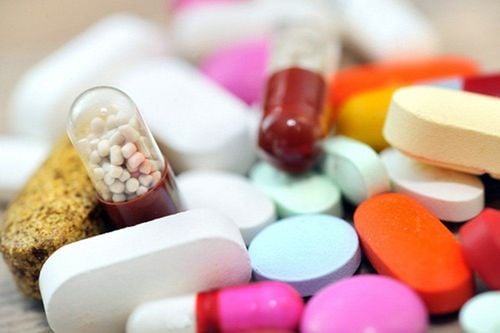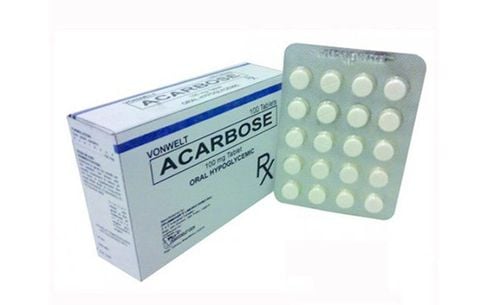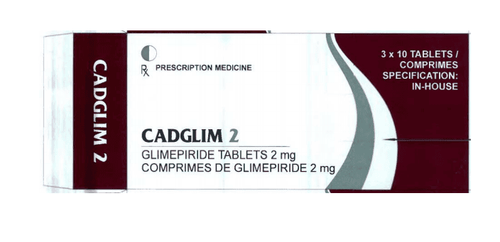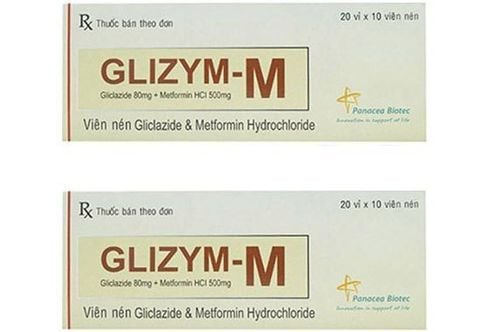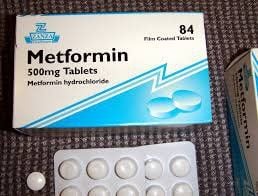This is an automatically translated article.
Denesity is commonly used in the treatment of sensory disturbances in patients with diabetes. The following article will provide information about the use of the drug as well as other necessary information for users to use the drug safely and effectively.1. What is Denesity?
How does Denesity drug work? Denesity drug belongs to the group of mineral and vitamin drugs containing the main ingredient is alpha lipoic acid with a strength of 200mg.
Pharmacodynamics
Alpha lipoic acid (thioctic acid) is a potent antioxidant coenzyme that exhibits activity in both aqueous and oily environments, helping to assist in the recovery of some other antioxidants such as coenzymes. Q10, vitamin E, vitamin C, glutathione. In biosynthesis, alpha lipoic acid glutathione also plays an important role. Accordingly, alpha lipoic acid inhibits the synthesis of interferon gamma as well as inhibits cytotoxicity. In addition, alpha lipoic acid is also used to reduce symptoms of multiple sclerosis (MS), autoimmune encephalomyelitis in animal models. Preliminary research shows that alpha lipoic acid has the ability to promote wound healing. In addition, they have the ability to increase the synthesis of new collagen fibers in fibroblasts, increase the efficiency of collagen type I expression and deposition in dermal fibroblasts. In particular, there are studies that show that lipoic acid also reduces or prevents the degeneration of Muller cells in degenerative retinal diseases and also helps effectively treat food poisoning caused by poisonous mushrooms.
Pharmacokinetics
After oral administration, alpha lipoic acid is rapidly absorbed. The absolute bioavailability of this acid is about 20%. Rapidly distributed into body tissues, the plasma half-life of thioctic acid is approximately 25 minutes. The relative bioavailability of thioctic acid when administered as a solid is 60% higher than that of the oral solution. Maximum plasma concentrations of approximately 4 μg/ml were measured approximately 0.5 hours after oral administration of the metabolite, with only small unchanged amounts recovered in the urine. Biotransformation occurs mainly by oxidation of chain truncation (beta-xodation) and/or S-methylation of thiol isotopes. On Invitro, thioctic acid reacts with metal ion complexes to form insoluble complexes with sugar molecules.
Dosage form: Soft capsule Packing: Box of 2 blisters, 15 tablets/blister
2. Indications and contraindications of the drug Denesity
2.1. Indications Support and treatment of acute and chronic liver disease, help detoxify the body from harmful toxicity of alcohol, heavy metals, toxic drugs... Support and prevent complications from from mild to severe neuropathy, cataracts, infections, retinal degeneration...of diabetes. Support the prevention and treatment of autoimmune encephalitis, coronary and cerebral atherosclerotic disease, high blood pressure, acute necrotizing encephalopathy, multiple sclerosis, Alzheimer's disease. Support and prevent stroke caused by cerebrovascular accident. Preventing hearing loss in the elderly, hearing loss caused by noise. Prevention of age-related macular, retinal and vitreous degeneration in normal people as well as prevention and treatment of Glaucoma. In addition, the drug is also indicated to prevent the formation of age spots on the skin and wrinkles on the face. Treatment of polyneuritis with sensory disturbances caused by diabetes.
2.2.Contraindications All cases of allergy to alpha lipoic acid or any ingredient of density medicine.
3. Dosage and how to use density medicine
3.1. Dosage For patients with diabetes:
Treatment of sensory disorders caused by diabetic polyneuropathy: a dose of 3 tablets once only 30 minutes before breakfast. Prevention of neurological complications, cataract complications, retinal degeneration, infections of diabetes: 1 tablet / time, use 2-3 tablets / day. Support for the treatment of diabetes: 1 tablet/time, 2-3 tablets/day. For skin: reduce age spots on the face, melasma, help support the regeneration of collagen fibers in the skin, slow down skin aging: dose 1 tablet/time, use 2 times/day. Patients should use continuously for 4-8 weeks to see the effect of the drug. For eyes: To relieve symptoms of Glaucoma: 1 tablet/time, 2 times/day. In addition, the drug density is also used to treat some of the following cases:
Treatment of Alzheimer's: 1 tablet/time, 2-3 times/day. Prevention of stroke, cerebrovascular accident, atherosclerosis: 1 tablet/time, 1-2 times/day. Treatment of depression, stress, recovery period after injury: 1 tablet/time, 1-2 times/day. Enhance immunity, increase resistance in the prevention and treatment of cancer, liver diseases, immunodeficiency: Dosage: 1 tablet/time, 3 times/day. Treatment of food poisoning: Dosage: 1 tablet/time, 3 times/day. Depending on the condition of each individual's disease, the doctor will prescribe the appropriate dose.
3.2. Usage Take orally. Take the drug with filtered or boiled water, do not drink with milk, juice, carbonated water... Should take the pill whole, do not bite, break or crush the tablet before swallowing the tablet. . Time to take the medicine: about 30 minutes before breakfast.
4. How to handle overdose, forget dose
4.1. Overdose Some common symptoms when taking Denesity drugs such as nausea, abdominal pain, low blood sugar. When the patient overdose with the above symptoms, it is possible to induce vomiting or use activated charcoal to remove the unabsorbed drug from the gastrointestinal tract. If the above symptoms do not improve or get worse, the patient should be taken to the nearest medical facility immediately for timely emergency treatment.
4.2. Missed dose Take the missed dose as soon as you remember it as soon as possible. However, if it is almost time for your next dose, skip the missed dose and take your next dose as scheduled. Do not take a double dose on your own to make up for the missed dose. Accordingly, taking the medicine at the same time every day can limit the chance of forgetting a dose.
5. Side effects when using the drug Denesity
When taking Denesity drugs may occur undesirable effects such as:
Gastrointestinal disorders: such as diarrhea, nausea, vomiting, stomach pain. Hypersensitivity reactions: such as skin allergy, urticaria and pruritus. Nervous system disorders: possible change or dysfunction of taste, loss of taste discrimination of the tongue. Another undesirable effect is a decrease in blood glucose levels: Symptoms are similar to those of hypoglycemia such as sweating, headache, dizziness and visual disturbances. Immediately notify your doctor or pharmacist when you occur side effects of the drug so that appropriate intervention can be taken.
6. Drug interactions
When used in combination with Cisplatin, there is a risk of reducing the therapeutic effect of Denesity. Risk of hypoglycaemia when used in combination with insulin or other hypoglycemic agents. Limit use with drugs containing insoluble compounds of iron, magnesium and calcium. It is possible to reduce the bioavailability of Denesity when combined with drugs containing valproic acid and/or sodium valproate.
7. Notes on use and storage of Denesity
7.1. Note There are not enough studies on the safety of using Denesity in pregnant women and nursing mothers. Therefore, self-administration of this drug is not recommended, it can replace other drugs with similar therapeutic effects. In case if it is not possible to replace and must use Denesity drug on this subject, it is necessary to consider the benefit and possible risk. Because the drug can cross the blood-brain barrier and have some undesirable effects such as dizziness, sweating, headache and visual disturbances, care should be taken when administering Denesity to patients who are drivers and operators. machinery operation. Consult your doctor to get all the necessary information to limit the risks. Blood sugar should be checked and the dose adjusted when using Denesity in the background of patients taking antidiabetic drugs. The product contains Sorbitol, should be used with caution for people with some type of sugar intolerance, consult your doctor. Products containing Sodium Propolpareben, Sodium methylparaben, soy milk may cause allergies. Therefore, caution should be exercised in people with a history of allergy to soy milk, parabens. 7.2. Storage Keep the medicine in a cool place, away from moisture and sunlight. Medicines should be kept at a temperature not exceeding 30 degrees Celsius. Keep out of reach of small children Do not put the medicine in the refrigerator or the bathroom. When the medicine has expired or is not required to use it, do not throw the medicine down the toilet or water pipe. You can consult a doctor or environmental company for appropriate treatment. Denesity is commonly used in the treatment of sensory disturbances in patients with diabetes. To ensure the effectiveness of treatment, patients need to take the drug according to the instructions of the doctor, professional pharmacist.
Follow Vinmec International General Hospital website to get more health, nutrition and beauty information to protect the health of yourself and your loved ones in your family.
Please dial HOTLINE for more information or register for an appointment HERE. Download MyVinmec app to make appointments faster and to manage your bookings easily.




